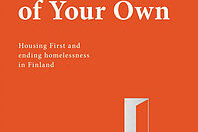Depaul Ireland Extends Housing for Almost 600 People
Evelyn Ring of the Irish Examiner reports on Depaul Ireland’s efforts to more permanently house nearly 600 people experiencing homelessness. CEO of Depaul Ireland, Kerry Anthony, says that the organization wanted to take a different approach to tackling to homelessness, beyond emergency accommodation. Of the 593 people who Depaul provided more suitable accommodation, 419 moved to supported temporary accommodation last year.
“It shows a pathway out, even if it is a complex and flawed one,” said Anthony.
Read the article here.
A Home of Your Own: Housing first and Ending Homelessness in Finland
The Y-Foundation has published a book outlining the country’s successful approach to reducing homelessness. A Home of Your Own: Housing first and Ending Homelessness in Finland includes recent figures of homelessness, strategies behind their efforts, and next steps in continuing to combat homelessness. This book describes the Finnish way of reducing homelessness, the special characteristics of the Finnish Housing First model, and its differences in comparison to the American Pathways Housing First model. It also gives voice to those with lived experience of homelessness who are now permanently housed because of the housing first approach.
Read the report here.

The State of Street Homelessness in Londrina, Brazil

Bonde explores the state of street homelessness in Londrina, Brazil. According to the technical-administrative advisor of the Municipal Department of Social Assistance, Priscila Brazão, there are an estimated 500 people experiencing street homelessness in Londrina, most prevalent among men age 18 to 39. Agencies throughout the city are joining together in an effort to conduct a count to obtain the most current measures.
Read the article here. (This article’s original text is in Portuguese)
Centering Youth of Color and LGBTQ Young People in Efforts to End Homelessness
“When we understand who experiences homelessness, we are led beyond the question of what scale of response is needed to end youth homelessness,” said Megan Gibbard Kline, Director at A Way Home America. Data from the Chaplin Hall’s Voices of Youth Count Initiative suggests that African American and Latino youth have a higher risk of experiencing homelessness. Analyzing the groups who are most vulnerable to homelessness can improve prevention efforts – allowing leaders and service providers to evaluate programs to ensure they meet the needs of such groups. This may mean considering the most vulnerable groups first when formulating solutions.
Read the article here.
